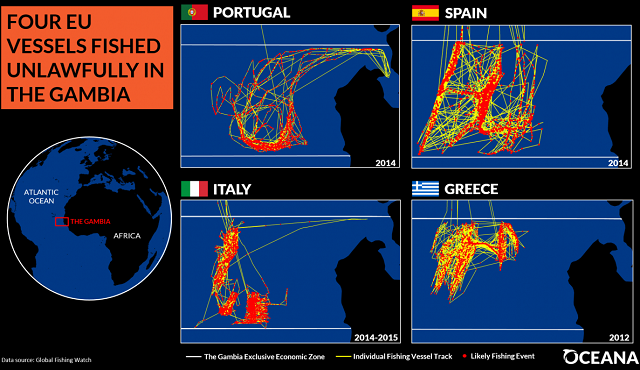New Regulation Addresses Unlawful Fishing in Africa
The environmental organization Oceana has released a report claiming unlawful fishing activities authorized by four European countries in the waters of The Gambia and Equatorial Guinea between April 2012 and August 2015.
Using data from Global Fishing Watch, an online technology tool that provides a global view of commercial fishing activity, Oceana found that Greece, Italy, Portugal and Spain awarded private fishing authorizations, which granted individual vessels access to these waters in contravention of E.U. law.
E.U. countries cannot legally issue permits for their vessels to fish in the waters of nations with dormant fishing agreements, for example with The Gambia and Equatorial Guinea. However, Oceana found that 19 E.U.-flagged vessels fished unlawfully for more than 31,000 hours between April 2012 and August 2015, which included:
• 18 E.U.-flagged vessels from Greece, Italy, Portugal and Spain fishing in the waters of The Gambia for 31,706 hours.
• one EU-flagged vessel from Spain fishing in the waters of Equatorial Guinea for 170 hours.
E.U. vessels fishing on the high seas or in foreign waters contribute 28 percent of the total E.U. catch. It is estimated that E.U. Member States have awarded more than 23,000 fishing vessel authorizations to fish outside E.U. waters since 2008.
In June 2017, the E.U. agreed on a new regulation governing the activities of the E.U.’s fishing fleet outside of its waters. The reformed law requires equal oversight of fishing vessels, regardless of where they operate or under what type of agreement. When fully implemented, the new law will significantly improve the oversight of the E.U.’s external fishing fleet and ensure the continued leadership of the E.U. in matters of global fisheries governance.
“Oceana’s findings show that even vessels from countries with strong legal frameworks, such as those within the E.U., can engage in unlawful practices. We are happy that the EU has just passed a new regulation that will help ensure the transparency of all fishing activities outside EU waters, and which calls on the rest of the world’s flag States to follow suit, and to pass laws and control measures to ensure that the fishing activities of their fleet are sustainable and transparent,” said María José Cornax, senior policy and advocacy director at Oceana in Europe.

that matters most
Get the latest maritime news delivered to your inbox daily.
The report is available here.

The opinions expressed herein are the author's and not necessarily those of The Maritime Executive.
